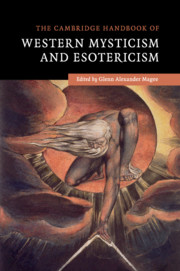Book contents
- Frontmatter
- Dedication
- Contents
- Acknowledgments
- Editor's Introduction
- List of contributors
- I ANTIQUITY
- II THE MIDDLE AGES
- 8 Sufism
- 9 Kabbalah
- 10 Medieval Christian Mysticism
- 11 Hildegard of Bingen and Women's Mysticism
- III THE RENAISSANCE AND EARLY MODERNITY
- IV THE NINETEENTH CENTURY AND BEYOND
- V COMMON THREADS
- Suggestions for Further Reading
- Index
- References
9 - Kabbalah
from II - THE MIDDLE AGES
Published online by Cambridge University Press: 05 May 2016
- Frontmatter
- Dedication
- Contents
- Acknowledgments
- Editor's Introduction
- List of contributors
- I ANTIQUITY
- II THE MIDDLE AGES
- 8 Sufism
- 9 Kabbalah
- 10 Medieval Christian Mysticism
- 11 Hildegard of Bingen and Women's Mysticism
- III THE RENAISSANCE AND EARLY MODERNITY
- IV THE NINETEENTH CENTURY AND BEYOND
- V COMMON THREADS
- Suggestions for Further Reading
- Index
- References
Summary
Introduction
“Kabbalah” is a multifaceted term which, in its most austere religious sense, denotes the “reception” of tradition from a higher source or an older generation. One of the earliest expressions of this sense of “Kabbalah” comes in a verbal form in the Mishnaic tractate Avot, which begins: “Moses received (kibbel) the Torah from Sinai, and transmitted it to Joshua; and Joshua to the elders; and the elders to the prophets; and the prophets transmitted it to the men of the great assembly.” This passage establishes an uninterrupted chain of transmission of Kabbalah, that is, of that which is “received,” going back to the theophany at Sinai. In so doing, it lends a sense of direct divine sanction to Kabbalah, which in this passage is connected to both prophecy and religious adjudication. It has thus been understood for millennia to go beyond the reception of the Written Torah and to include the entire tradition of commentary, law, and ethics known as Oral Torah, thereby giving even seemingly innovative interpretations and practices an air of primordial authority.
Abraham Joshua Heschel has observed that “the term kabbalah denotes the act of taking an obligation upon oneself. The term in this sense has the connotation of strictness and restraint. Yet kabbalah in its verbal form means also: to receive, to welcome, to greet.” Heschel goes on to note that the obligatory usage has a legal meaning, whereas the welcoming connotation is spiritual, but that the two are inseparable from each other. In the traditional view, a binding commitment to established statutes goes hand-in-hand with a sense of personal sanctity and awe. It is from this standpoint that starting in the Middle Ages, the term “Kabbalah” came to denote a sacrosanct esoteric tradition fundamentally based within Jewish praxis. Kabbalah, in this view, was part of God's revelation through Torah to his people, Israel. In the words of the thirteenth-century Zohar: “There are three interconnected levels: the blessed Holy One, Torah, and Israel. Each is level upon level, concealed and revealed.” Kabbalah thus became associated not only with the revealed and received, but also with the received and concealed elements within what came to be three of the foundation stones for all of Judaism, namely, God, Torah, and Israel.
- Type
- Chapter
- Information
- The Cambridge Handbook of Western Mysticism and Esotericism , pp. 95 - 106Publisher: Cambridge University PressPrint publication year: 2016



